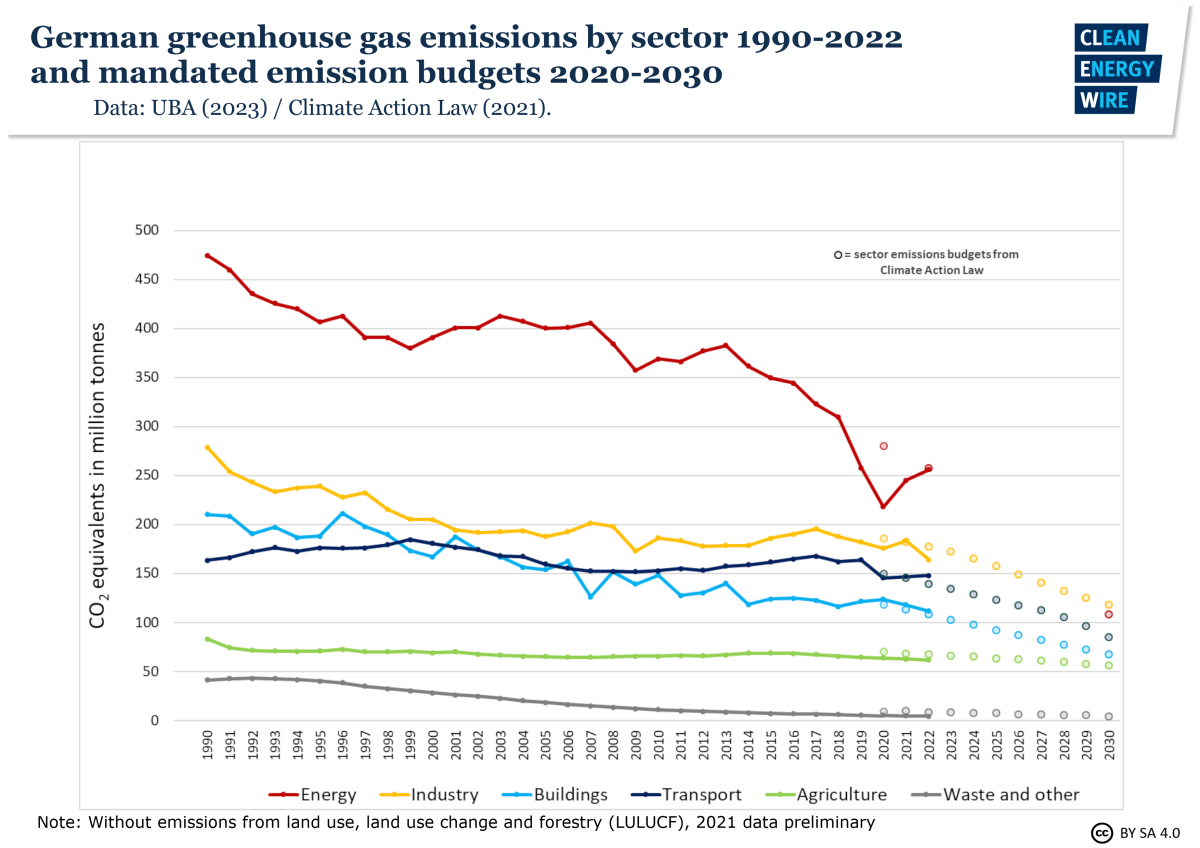Germany could face costly EU target miss as govt overestimates its climate programme – expert council
Germany’s leading climate council has said that the government’s 2023 climate policy package presented in June is not enough to reach 2030 emissions reduction targets, and that the ruling coalition overestimates its potential to lower emissions. This could result in significant costs for the country, as Germany is at risk of missing crucial EU climate targets, it said.
In its latest report, the Council of Experts on Climate Change said the government decided on a “comprehensive” and yet “insufficient” climate action programme. The government stated itself in June that even with the new measures in place, Germany is projected to emit a total of 200 million tonnes of CO2 by the target year and thus will exceed the amount permitted at the end of the decade.
The experts have now said that this gap is “very likely” to become even larger. However, as the government provided “inconsistent data” concerning the assumed emission reductions of many of the measures of the 2023 climate protection programme, it is “not possible to make a reliable statement about the overall reduction effect,” the expert group said. There is a stark discrepancy in terms of the status and details of the proposed measures. Some are already in place, while the specifics of others remain vague, said the report. The council called for closer monitoring to evaluate whether the desired effects are attained.
"The problem is that the government has not presented a plan on how to close this gap" of 200 million tonnes or more, said the council's deputy chairwoman, Brigitte Knopf, at a press conference.
Government numbers were based on assumptions which “no longer correspond to the expected development from the current perspective,” and the implementation of a number of measures in the programme are subject to considerable uncertainty. “The expected total reduction is therefore presumably overestimated,” said Hans-Martin Henning, head of the council. The report calls for more government action to get lagging sectors back on track.
The government coalition parties promised the comprehensive programme in their coalition agreement from 2021. It was delayed for months as the trio fought over key climate policy drafts, such as the de-facto ban on conventional fossil fuel heaters, the reform of the climate action law, or proposals on how to clean up the transport sector.
Germany off track for 2030 and 2045 climate targets – environment agency
The emissions projections report 2023 by the Federal Environment Agency (UBA), which was also published today, shows that Germany will miss its climate targets for 2030 and 2045 without additional measures despite considerable progress being made. The report was used by the government to make assumptions about how much its climate programme would lower greenhouse gas emissions. It showed that even in a best-case scenario, Germany would still emit about 200 million tonnes of CO2 equivalents until 2030 more than allowed under its climate action law. The government had published a first preview of the projections for the years up to 2030 when it presented its package in June.
Contrary to what the projections show, chancellor Olaf Scholz said his government was doing everything that is necessary. "I am firmly convinced that with the measures and decisions we have taken, we are doing exactly what is needed for Germany to become CO2 neutral in 2045 and so that we can also achieve the 2030 climate targets," said Scholz at a press conference during a visit to western German energy transition frontrunner community Simmerath. (The country's official target is climate neutrality 2045, not CO2 neutrality. Find more info on the difference here.) He added that the "great ecological industrial modernisation" was "progressing at a great pace."
The Institute for Applied Ecology, which compiled the projection report for Germany’s environment agency, said some measures taken since the previous report was made in 2021 had led to tangible reduction effects. “This is especially the case regarding faster renewables expansion and the accelerated phase-out of coal capacity,” said co-author Ralp Harthan. “However, the government must take further steps to achieve net-zero greenhouse gas emissions by 2045,” he urged.
Economy and climate action minister Robert Habeck said the emissions reduction gap “that was left over by the previous government” under chancellor Angela Merkel would be closed by about 80 percent thanks to the new programme. “That’s significant progress because we have initiated some decisive actions, covering renewable power expansion, the climate and transformation fund and the targeted support for industry decarbonisation,” the Green Party politician said, adding that “a lot remains to be done of course.” Implementing decided measures would now be of the essence. “And working towards that goal is a task for the whole government.”
Significant costs looming as Germany at risk of missing EU targets
Lagging emission reductions in several sectors is not only a domestic issue, since Germany is also subject to binding EU climate legislation. The climate council emphasised that the government shouldn’t expect to reach the climate targets for the sectors covered by the EU’s so-called effort sharing regulation, and should instead prepare to miss the targets by a “significant” margin. About 150 of the 200 million tonnes CO2 emissions gap projected by the government until 2030 would fall under this regulation, said researcher Knopf.
She cautioned that a focus on getting Germany on track by 2030 would not suffise: "It is not enough to reach targets in 2030, we have annual EU targets that we have to reach," said Knopf.
Member states must reach annual reduction targets for the combined greenhouse gas emissions from transport, buildings, waste, industry and agriculture. If they fail to reach these targets, they must purchase emission allocations from those countries that surpass their own national targets. Germany recently had to pay several million euros for these allocations for the years 2013 to 2020.
As buildings and transport are among the toughest sectors to decarbonise – transport has long been considered the energy transition’s “problem child” – Germany could face a costly problem. “If Germany wants to avoid substantial penalties or the purchase of emission allocations, the government has to get the affected sectors back on track to reaching the climate targets.”
Euractiv reported that costs for allocations from other countries could run into several billion euro. “The price for emission allowances under the EU Climate Change Regulation is basically still completely uncertain,” Jakob Graichen, a senior expert at the Institute of Applied Ecology (Öko Institut) told the news service. As the price will likely be based on the upcoming EU emissions trading scheme for buildings and transport, which, according to the expert, would then be prices of “more than €50 per emission allowance, possibly even several hundred euros”.
Euractiv writes that at a gap of 150 million allowances, the penalty "could be hefty: upwards of 7.5 billion euros at the very least, although 30 billion euros could easily be reached."
Government must present coherent plan
According to the council, the government still lacks “a cohesive, internally coherent, and consistent plan,” because the emissions gaps could not be closed by just introducing individual measures. The government should introduce strict emission limits in the national carbon price for transport and heating fuels as soon as possible. Germany plans to eventually switch from a fixed CO2 price without an emissions limit, to a cap-and-trade system, in which a limit would be set and the market would decide the price paid per tonne of emissions.
The switch is not expected until 2026, at the earliest. But such a fixed limit would have to be accompanied by measures to take the burden off businesses and especially lower income households, such as the so-called “Klimageld” (climate bonus), said the experts. The idea of using revenues from emissions trading and returning them to citizens via per capita payments has been delayed.
The experts also called on the government to explore new options, such as finally tackling climate-damaging subsidies.
The government said in its 2023 programme that it wants to present a reform package, "but when and in what form is very unclear," said council member Knopf. "The government must present a concrete plan."
Transport and building measures “fail to meet requirements” for emergency programme
Together with the climate action programme, the government also presented its draft reform of the country’s Climate Action Law. The law, first introduced in 2019, set emissions reduction targets and established the independent Council of Experts on Climate Change.
The council’s tasks include evaluating the emergency programmes which the government has to introduce for sectors that miss their annual climate targets. The proposed reform, however, would put an end to these sector-specific immediate programmes, and will likely be decided on by parliament soon after the summer recess. Instead, if for two years in a row projections show cumulative emissions exceed the targets set for the years until 2030, the government has to decide on a programme of measures in all sectors.
For now, the council assessed the measures for the transport and building sectors, which failed to stay within 2022 emissions budgets. As the government’s package showed a cumulative emissions reduction gap in both sectors by 2030, it “failed to meet the requirement for an emergency programme” under the climate law, said the experts.
The climate council added that the government likely oversold the emissions reduction potential of measures in these two sectors.
NGOs call on government to increase efforts
In reaction to the two reports published today, several environmental NGOs called on the government to do more.
"Despite some progress, we are still a long way from being on course to meet the climate challenge," said Stefanie Langkamp, head of politics at the NGO group Climate Alliance Germany. The government urgently had to take action. "The longer it delays effective measures, the more ambitious the savings will have to be in the future and the more expensive and difficult it will be to achieve the targets for climate protection," said Langkamp.
NGO Environmental Action Germany (DUH) called for a “climate emergency programme” that “massively” steps up efforts to bring emissions reduction in line with the targets. DUH head Jürgen Resch said the NGO is preparing to take legal steps to actively enforce stronger measures in courts, for example in the transport sector. “A speed limit of 100 kilometers per hour on motorways, 80 on country roads and 30 as the average speed in inner cities, reducing climate-damaging subsidies, the expansion of climate-friendly mobility,” are some of the targets the organisation aimed to achieve through litigation, Resch said.



